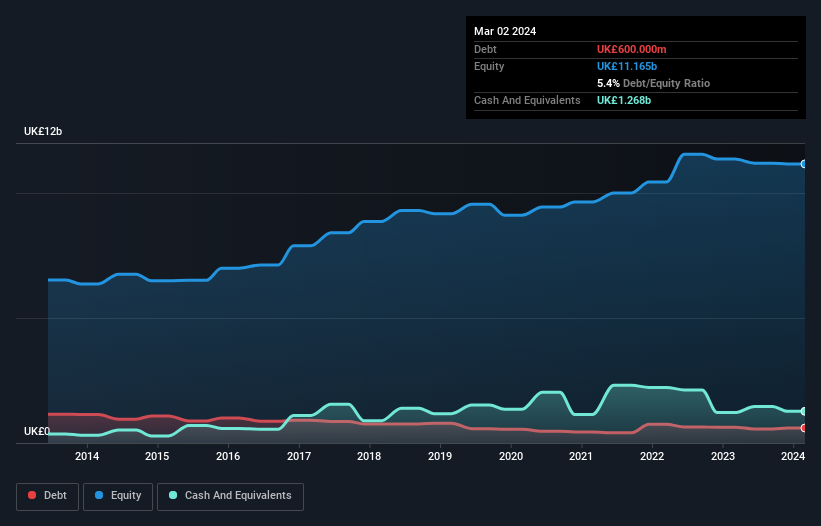- United Kingdom
- /
- Food
- /
- LSE:ABF
These 4 Measures Indicate That Associated British Foods (LON:ABF) Is Using Debt Safely
Legendary fund manager Li Lu (who Charlie Munger backed) once said, 'The biggest investment risk is not the volatility of prices, but whether you will suffer a permanent loss of capital.' It's only natural to consider a company's balance sheet when you examine how risky it is, since debt is often involved when a business collapses. We can see that Associated British Foods plc (LON:ABF) does use debt in its business. But should shareholders be worried about its use of debt?
When Is Debt Dangerous?
Generally speaking, debt only becomes a real problem when a company can't easily pay it off, either by raising capital or with its own cash flow. If things get really bad, the lenders can take control of the business. However, a more usual (but still expensive) situation is where a company must dilute shareholders at a cheap share price simply to get debt under control. Having said that, the most common situation is where a company manages its debt reasonably well - and to its own advantage. When we think about a company's use of debt, we first look at cash and debt together.
See our latest analysis for Associated British Foods
How Much Debt Does Associated British Foods Carry?
The image below, which you can click on for greater detail, shows that Associated British Foods had debt of UK£600.0m at the end of March 2024, a reduction from UK£630.0m over a year. However, its balance sheet shows it holds UK£1.27b in cash, so it actually has UK£668.0m net cash.

A Look At Associated British Foods' Liabilities
According to the last reported balance sheet, Associated British Foods had liabilities of UK£3.54b due within 12 months, and liabilities of UK£4.04b due beyond 12 months. Offsetting these obligations, it had cash of UK£1.27b as well as receivables valued at UK£1.75b due within 12 months. So its liabilities total UK£4.56b more than the combination of its cash and short-term receivables.
This deficit isn't so bad because Associated British Foods is worth a massive UK£20.3b, and thus could probably raise enough capital to shore up its balance sheet, if the need arose. But it's clear that we should definitely closely examine whether it can manage its debt without dilution. While it does have liabilities worth noting, Associated British Foods also has more cash than debt, so we're pretty confident it can manage its debt safely.
On top of that, Associated British Foods grew its EBIT by 34% over the last twelve months, and that growth will make it easier to handle its debt. The balance sheet is clearly the area to focus on when you are analysing debt. But ultimately the future profitability of the business will decide if Associated British Foods can strengthen its balance sheet over time. So if you're focused on the future you can check out this free report showing analyst profit forecasts.
But our final consideration is also important, because a company cannot pay debt with paper profits; it needs cold hard cash. While Associated British Foods has net cash on its balance sheet, it's still worth taking a look at its ability to convert earnings before interest and tax (EBIT) to free cash flow, to help us understand how quickly it is building (or eroding) that cash balance. During the last three years, Associated British Foods produced sturdy free cash flow equating to 73% of its EBIT, about what we'd expect. This cold hard cash means it can reduce its debt when it wants to.
Summing Up
While Associated British Foods does have more liabilities than liquid assets, it also has net cash of UK£668.0m. And we liked the look of last year's 34% year-on-year EBIT growth. So we don't think Associated British Foods's use of debt is risky. Above most other metrics, we think its important to track how fast earnings per share is growing, if at all. If you've also come to that realization, you're in luck, because today you can view this interactive graph of Associated British Foods's earnings per share history for free.
If you're interested in investing in businesses that can grow profits without the burden of debt, then check out this free list of growing businesses that have net cash on the balance sheet.
New: Manage All Your Stock Portfolios in One Place
We've created the ultimate portfolio companion for stock investors, and it's free.
• Connect an unlimited number of Portfolios and see your total in one currency
• Be alerted to new Warning Signs or Risks via email or mobile
• Track the Fair Value of your stocks
Have feedback on this article? Concerned about the content? Get in touch with us directly. Alternatively, email editorial-team (at) simplywallst.com.
This article by Simply Wall St is general in nature. We provide commentary based on historical data and analyst forecasts only using an unbiased methodology and our articles are not intended to be financial advice. It does not constitute a recommendation to buy or sell any stock, and does not take account of your objectives, or your financial situation. We aim to bring you long-term focused analysis driven by fundamental data. Note that our analysis may not factor in the latest price-sensitive company announcements or qualitative material. Simply Wall St has no position in any stocks mentioned.
About LSE:ABF
Associated British Foods
Operates as a diversified food, ingredients, and retail company worldwide.
Flawless balance sheet with proven track record and pays a dividend.
Similar Companies
Market Insights
Community Narratives



